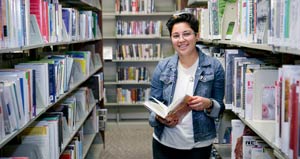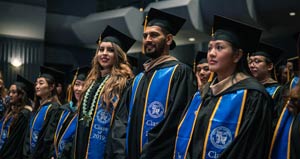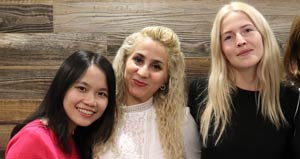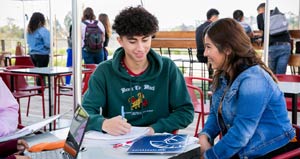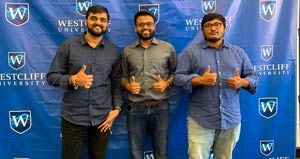Sustainable Development Goals
Westcliff’s Sustainability Initiatives
The 2030 Agenda for Sustainable Development, adopted by all United Nations (U.N.) Member States in 2015, provides a shared blueprint for peace and prosperity for people and the planet, now and into the future. At its heart are the 17 Sustainable Development Goals (SDGs), which are an urgent call for action by all countries – developed and developing – in a global partnership and all organizations.
Westcliff University promotes entrepreneurship, innovation, and sustainability through its programs and in the University’s culture. In the past few years, the university has started multiple projects, events and initiatives about sustainability that positively impact the community. This section summarizes the University’s progress and impact on six sustainability goals in local and global communities including: enhancing access to quality education, promoting gender equality, reducing inequalities, contributing to economic growth, promoting peace and justice and collaborating in international efforts of promoting SDGs best practice.
Westcliff’s Sustainability Goals
Quality Education
Gender Equality
Decent Work and Economic Growth
Reduced Inequalities
Peace, Justice, and Strong Institutions
Partnerships for the Goals
SDG 4: Quality Education
A high-quality education should be an area where universities excel. Education is a key gateway out of inequalities, especially multi generational ones. In addition to improving quality of life, access to inclusive education can help equip locals with the tools required to develop innovative solutions to the world’s greatest problems. According to the U.N., without additional measures, by 2030, 84 million children and youth will be out of school and 300 million students will lack basic numeracy and literacy skills.
As an active member of the global community, Westcliff University commits to deliver quality education to its students globally so that the University’s graduates achieve the skills and knowledge that could contribute to improving the economic growth of their local communities. Westcliff University offers its resources and education opportunities to all, regardless of their background, race, color, religion, sex, national origin, disability, age, genetics, retaliation, armed forces service members, or veteran status.
Westcliff University has global educational partnerships in Nepal, Vietnam, Jordan and Dubai. Unlike the U.S. where students need to obtain certain teacher credentials in order to teach, in countries such as Nepal and Vietnam, students with a higher education degree can teach at the primary level. In 2023, 40% of Westcliff students graduated with a degree that qualifies them to teach at the primary school level in their home countries. Westcliff University promotes social responsibility in its curriculum so that students graduate with an understanding of how they may use their acquired skills and knowledge to improve conditions for those who are less fortunate.
Public Resources
Besides its program offerings, Westcliff University offers other educational public resources.
Public Events
- Distinguished Innovator Speaker Series
- Off Base Transition Training (OBTT) and Meet & Greet
- Chaos Management Strategy
Growing Together Series – Westcliff Early Learning Academy
7th Annual Symposium of Applied Research (SOAR)
The Symposium of Applied Research (SOAR) brings the community together to share experiences, research results, and research applications. This inclusive symposium welcomes speakers and attendees from all specialized and interdisciplinary fields and provides an opportunity for the exchange of ideas about developing real solutions that have a real impact on society.
The University ensures that access to these activities is accessible to all, regardless of ethnicity, religion, disability immigration status or gender.
- Westcliff University Non-Discrimination Policy
- Western State College of Law at Westcliff University’s Principles of Community
Education outreach activities beyond campus
Not only do Westcliff’s graduates pursue teaching careers, they also participate in non-profit organizations that aim to end educational inequity in their communities. For example, Westcliff students from Nepal actively participate in Teach for Nepal – a movement of young professionals who are committed to ensure that all children in Nepal receive quality education. Westcliff University’s campuses in Nepal collaborates with Teach for Nepal to ensure that the program is running efficiently.
In 2023, Westcliff has partnered with a Microsoft Philanthropies program – Technology Education and Learning Support (TEALS) to involve students, students, staff, faculty, and alumni to the volunteer program that help high school classroom educators learn to teach computer science on their own by pairing them with in-person or remote volunteers from the tech industry and proven curricula.
SDG 5: Gender Equality
Gender equality is a fundamental human right, and a foundation for a peaceful, prosperous and sustainable world. Providing women and girls with equal access to education is a key part of delivering gender equality, but universities also have a wider role to drive forward gender equality in their communities.
Westcliff University is committed to providing quality education and services for all genders. This practice is applied in all aspects of the University, including staff, faculty, and students. Observing that female students present less in STEM programs, the university has launched scholarship programs that aim at supporting women in STEM. Westcliff has formed a partnership with Women in Tech – an international non-profit organization – to promote girls’ and women’s empowerment around the world. In Nepal, the University partners with the Ministry of Education to offer affordable and quality education to Nepali students, especially female students.
Education Access Plan
Gender Equality Progress Measures
Retention and completion rate is tracked every year by the Department of Institutional Research, disaggregated by degree program, age, ethnicity, and gender. According to Westcliff University’s Department of Institutional Research, the graduation rate for female students is generally higher than male students. Women graduated with an average graduation rate of 63%, while male students’ graduation rate ranges from 54% to 61%. Similar patterns are observed from the retention rate. It is noticed that the graduation rate of two groups gets more balanced in 2020 and 2021. The improvements resulted from multiple initiatives including curriculum development, personalized tutoring services and enhancing academic resources to students in need.
Women’s Progress Measures
The University ensures that women receive dedicated support and resources. policy of non-discrimination against women, non-discrimination policies for transgender, maternity and paternity policies, and policies protecting those reporting discrimination are made available.
Women’s Mentoring Schemes
SDG 8: Decent Work and Economic Growth
Universities as employers can lead the way, as teachers can educate for the future, and as innovators can develop new and fairer ways of working. Westcliff University is committed to creating an environment and culture that embraces diversity, challenge, excitement, and a collaborative spirit with a lot of opportunities for growth for both students and employees alike.
Employment Practice
Students and Work Placements
As an important member of the local and global community, Westcliff University offers quality education to its students and ensures that students become an important part of the local economy after graduation. The university’s curriculum emphasizes practical experience. Students are encouraged to participate in internship programs and gain real-world experience. In the past three years, Westcliff University maintains a consistent proportion of students who engaged in an internship (above 30% globally). In addition, the University SMART™ MBA Consulting capstone program enables students to act as management consultants for global powerhouses, regional brands, nonprofits, and startups.

SDG 10: Reduced Inequalities
Equality needs to underpin every aspect of sustainability if the objectives of the SDGs are to be met. Although SDG 5 explores this through the prism of gender, SDG 10 takes a broader look at the intersectionality of disadvantage. This disadvantage can be felt through all of the other key issues raised by the SDGs – disadvantaged groups are both more likely to be unable to take advantage of progress and to suffer from the effects of climate change.
Westcliff University strives to reduce social inequalities at all levels. The University is committed to providing services and recruiting students from under-represented groups. This includes first-generation students, students from developing countries, and students with disabilities. Westcliff has anti-discrimination policies written in the student and employee handbook and enforced by the University. In 2020, the Diversity, Equity and Inclusion committee was formed to align closely with the University’s strategic plan.
Diversity, Equity, and Inclusion (DEI)
The Diversity, Equity, and Inclusion (DEI) mission of Westcliff University is to promote an environment in which each person associated with the university can achieve their full potential independent of ethnicity, race, gender, age, pregnancy, socioeconomic status, abilities or disabilities, sexual orientation, religion, beliefs, or national origin. The University strives to achieve an intellectual, cultural, and social environment where all are free to contribute without prejudice, intimidation, and discrimination – an environment where all recognize personal dignity and respect for the individual.
Cultural Heritage Videos
- Hispanic Heritage Month
- Asian American & Pacific Islander Heritage Month (AAPI)
- Black History Month ft. Jeanora Price
Other related charity and volunteer activities
International Food and Culture Festival
- Annual event to honor and celebrate the community’s diversity
- Open to the public
- 100+ countries represented
Community Engagement
During 2023, 584 student and faculty volunteers dedicated an impressive 5,188 combined hours of community service and generously donated 1,100 much-needed items throughout the year to those in need. The University has been nominated by partner non-profit Unlimited Possibilities, and recognized as the only higher educational institution on Orange County Business Journal’s 2023 Companies That Care list for substantially enhancing the well-being of our community, notably contributing more than $70,000 to various local non-profit organizations.
SDG 16: Peace, Justice and Strong Institutions
Goal 16 is about promoting peaceful and inclusive societies, providing access to justice for all and building effective, accountable and inclusive institutions at all levels. Governments, civil society and communities need to work together to find lasting solutions to conflict and insecurity. Strengthening the rule of law and promoting human rights is key to this process, as is reducing the flow of illicit arms, combating corruption, and ensuring inclusive participation at all times. Westcliff University takes pride in having representation at the University at all levels to ensure that all interests and concerns are heard and recognized.
Students’ organizations that provide support and social activities for students
Westcliff University student organizations’ offer a myriad of benefits, making it a compelling choice for any student. Firstly, it provides a unique platform for personal and professional growth, fostering leadership skills, teamwork, and networking opportunities that are invaluable in the future. Moreover, these clubs often revolve around shared passions and interests, creating a sense of belonging and camaraderie within the community.
Identify and engage with local stakeholders
Westcliff certainly believes in the importance of engaging with local stakeholders. It not only increases the visibility of the University within the community but also provides a better understanding of the issues surrounding the area. The Social Responsibility Committee exists to advance positive relations and to maintain consistent communication between the university and its communities.
Working with government
Faculty and Administrators of Westcliff have a history of working with governments. They consult with government bodies and give expert advice that influences the organization’s decisions and policies in multiple aspects, such as education, entrepreneurship, and international relations.
Western State College of Law is committed to providing current lawyers with additional education and training beyond graduation from law school. The law school takes great pride in its student run, faculty supervised, law review, which publishes articles every year submitted by law professors and practicing attorneys.
The Western State College of Law Environmental Law Society is dedicated to providing and promoting a forum for education, advocacy, and scholarship aimed at protecting the environment. ELS seeks to inform the law school and surrounding community about environmental issues and sponsor engaging activities such as symposia, documentaries, research projects, social and networking events.
SDG 17: Partnerships for the Goals
Sustainable development is the responsibility of every part of society, across the world. It cannot be achieved without linkages, across the goals, but also between institutions, governments, companies, NGOs, and people. This sustainability goal aims to revitalize the global partnership for sustainable development by bringing governments, civil society, scientists, academia, and the private sector together to achieve the SDGs (United Nations, n.d).
Higher education plays an important role in providing students with a well-rounded understanding of how global challenges need to be addressed. The knowledge about sustainability in classrooms enhances the development of students’ global competence and ability to collaborate and lead across national boundaries.
Westcliff University is offering classes in all of its programs where students learn about and become more globally aware of sustainability challenges. The University revamped its offerings to incorporate more sustainability related topics.
In addition, Westcliff University is actively involved in policy-making discussion and conferences, at a local, regional, national and/or global levels to implement programs and policies to address sustainability goals. Through international collaboration, the University compares different approaches and develops best practices on addressing sustainability goals.
Relationships to Support the Goals
The University partners with governments and non-profit organizations, in addressing sustainability challenges:
- Partnership with Nepali Ministry of Education to provide quality and affordable education to Nepali students.
- Support students to participate in research, conferences and events related to sustainability goals: Westcliff University and King’s College Nepal Go Global
- Eliminate gender gap in technology: partnership with Women in Tech
- Contribute to end hunger through student-volunteer events in partnership with Second Harvest FoodBank, South County Outreach and Always Lean Forward Food Donation
- Reduce inequalities through student-volunteer events in partnership with UCP of Orange County, Together We Rise, Kappa Alpha Psi Fraternity – Riverside Chapter, Tustin Unified School District
- Promote health awareness, good health and well-being through charity events with American Cancer Society/Association, Mercy Hospital, Children’s Hospital of Orange County
- Offer consulting services for non profit organizations such as Girl Scouts of Orange County – Social work, Fullerton Library – Public library, Harmonious – Animal conservation, Simplified – Education, Affordable Housing – Hispanic community first time home buyers, Hera Hub – help requalify inmates after release from prison to find jobs
- Provides basic necessities to the homeless and scholarships to underserved youth: Western State Kicks Off Fall Semester with Community Service for the Vulnerable
Partnerships which focus on enhancing education access and improving quality education:
Conference/forum involving government and/or NGOs to discuss SDGs topic
Collaborations with Non Profit Organizations
Collaborations for Sustainability Goals
Sustainability Annual Report
Education for the SDGs
Westcliff University is offering classes in all of its programs where students learn about and become more globally aware of sustainability challenges. The university has incorporated sustainability knowledge into more than 70 courses in its current offerings.
Additional Information
Contact Westcliff University’s Sustainability Team
If you have questions or need additional information about Westcliff University’s Sustainability Development Goals and initiatives, you may contact us at any time.
Address:
17877 Von Karman Ave
4th Floor
Irvine, CA 92614
Phone:
(949) 825-5999

